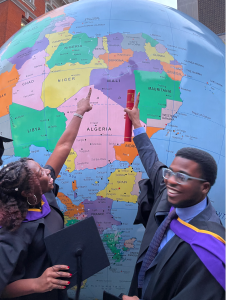The more I learn about anti-Blackness, the more I realise it is everywhere. Whether we are talking about Europe, the Americas, Asia, the Middle East or even sub-Saharan Africa, the impact of inequalities and prejudice against Black people is pervasive. However, when we consider solutions to anti-Blackness and racism, so often our thinking is country-specific. EDI models in the UK, tend to be separated from the imperial power dynamics that continue to obstruct the economies of Black-majority countries. Hierarchies from the caste system in South Asia are distinguished from skin bleaching in Nigeria. So, when a dear friend mentioned the AfroEuropeans Conference to me, my ears pricked up to listen.
What is the Afroeuropeans conference?
The AfroEuropeans Conference, is an annual event that aims to bring together academics, activists, artists and community thinkers exploring experiences of Blackness in Europe. The Conference was first hosted in Spain in 2005, but since then has moved between the United Kingdom, Portugal, Finland and, this year, Belgium. Conventionally, universities host the event due to the resources and physical space. In this case, the Vrije Universiteit Brussel opened their campus to welcome people who were interested from across Europe. Over 30 sessions were hosted across 3 days, and participants could attend different streams to discuss themes of: intersectionality; policy and activism; arts and aesthetics; healthcare; and decolonising knowledge and institutions. Each session had 3-4 speakers and a chair. The speakers were generally PhD candidates or professors who were sharing 15 minute presentations of their research before taking 1 or 2 questions from the room.
Who did you hear from?
It was impossible to attend every session, so I did my best to try and attend events from several streams to create a broad experience of the event. I attended sessions on:
- Representation, Activism and Policy Representation
- Care in Black and White: “Race” in Healthcare in Europe
- The Relevance of Pan-African Thought to Europe
- Contemporary Blackness and Black Histories in Urban Europe
- Decolonising Knowledges
The sessions that particularly stood out to me were the Keynote Speeches. We heard from Professor Olivette Otele (SOAS, University of London), Professor Kehinde Andrews (Birmingham City University) and Mireille-Tsheusi Robert.
Professor Otele reminded us of the importance of understanding our history, our joint stories and our longstanding presence in Europe to inform our present moment. She spoke of powerful Black thinkers, artists, politicians who had a presence in Europe as far back as the Roman period. She contextualised the event by challenging the assumption that Black people had only recently migrated to Europe.
Professor Andrews reminded us of the importance of understanding Blackness not as a racial category but as a political consciousness; a consciousness that is collective and global. He spoke of how important it is to remember our movements accurately, celebrating the women who drove Black liberation movements across time. He reminded us that liberation requires us to look beyond the geographies of simply where we are; and dream of where we want to be.
Mireille-Tsheusi Robert spoke candidly of the caution Black activists should have when engaging with white researchers. She spoke of studies on Black communities in Europe and how important it is for white researchers to learn to value the arguments, analysis and recommendations of the community members they study as subjects. Robert’s unapologetic exploration of interpersonal relationships was striking, direct and honest.
Another particularly impactful session was On The Relevance of Pan-African Thought to Europe. In this session, Professor Otele, Dr Amzat Bourkari-Yabara, Associate Professor Mame Fatou-Niang Dr Michael McEachrane, Professor S.A. Smythe and Professor Stefaan Smis spoke powerfully about the utility and limitations of Pan-African thought. They began by framing Pan-Africanism as an anti-capitalist ideology around which African descendents, across the world, can organise. They explored whether Pan-Africanism was innately associated with a mystical and idealistic view of Africa or whether it could have practical value to improve the status quo. This session stood out because of its focus not on oppression, but on the logistics of empowerment.
Another highlight of the event was the guided tour of the VUB Decolonising Library. A number of students had received funding from a local development organisation to establish a Decolonial Library on campus. This library had a few books, but was mainly a learning and wellbeing space for students to discuss themes of liberation and decoloniality. The VUB students and alumni who had founded and ran this space were insightful, inspired and energising. Their work so clearly required a lot of fight and dedication and it was a pleasure to meet them. They warmed my heart so much that I asked for a quick picture, which is the main photo for this blog post.
What reflections did you walk away with?
In addition to the thought-provoking speakers, the attendees of the Conference were incredible. From academics, to grassroots organisers, to those in the civil society space, the rich audience that the conference had attracted was simply stunning. Attendees represented a range of views, perspectives, experiences and geographies. Sadly, there was not nearly enough time within the schedule for peer learning and multi-directional sharing. However, I was still glad to meet some great thinkers and practitioners pushing for anti-racism and Black liberation within Europe.
Were there any challenges?
One of the biggest tensions I sensed within the conference, was the lack of an honest expression of who this conference was intended to serve. In many ways, this was an opportunity for researchers to receive peer feedback on research for free, without needing to cite the analysis and contributions of the attendees who engaged with their work. It would be remiss for me not to acknowledge that this felt both sad and extractive. This was worsened by the fact that Black voices were not prioritised in this space, not as experts, researchers or to weight to the attendee list. In many cases, white researchers took up extensive space and in some cases were not sensitive or empowering in the way they were talking about Black communities – using words like “blacks” (unironically) for example. If the focus had honestly been the empowerment of Black communities at its core, it is possible that the registration process, delivery, and structure of the event may have felt different.
That being said, this event was still a powerful gathering of Black liberation thinkers, activists and artists. This event attracted wonderful people who I am lucky to have met. I will definitely be keeping my eyes peeled to attend versions of this event in the future.

